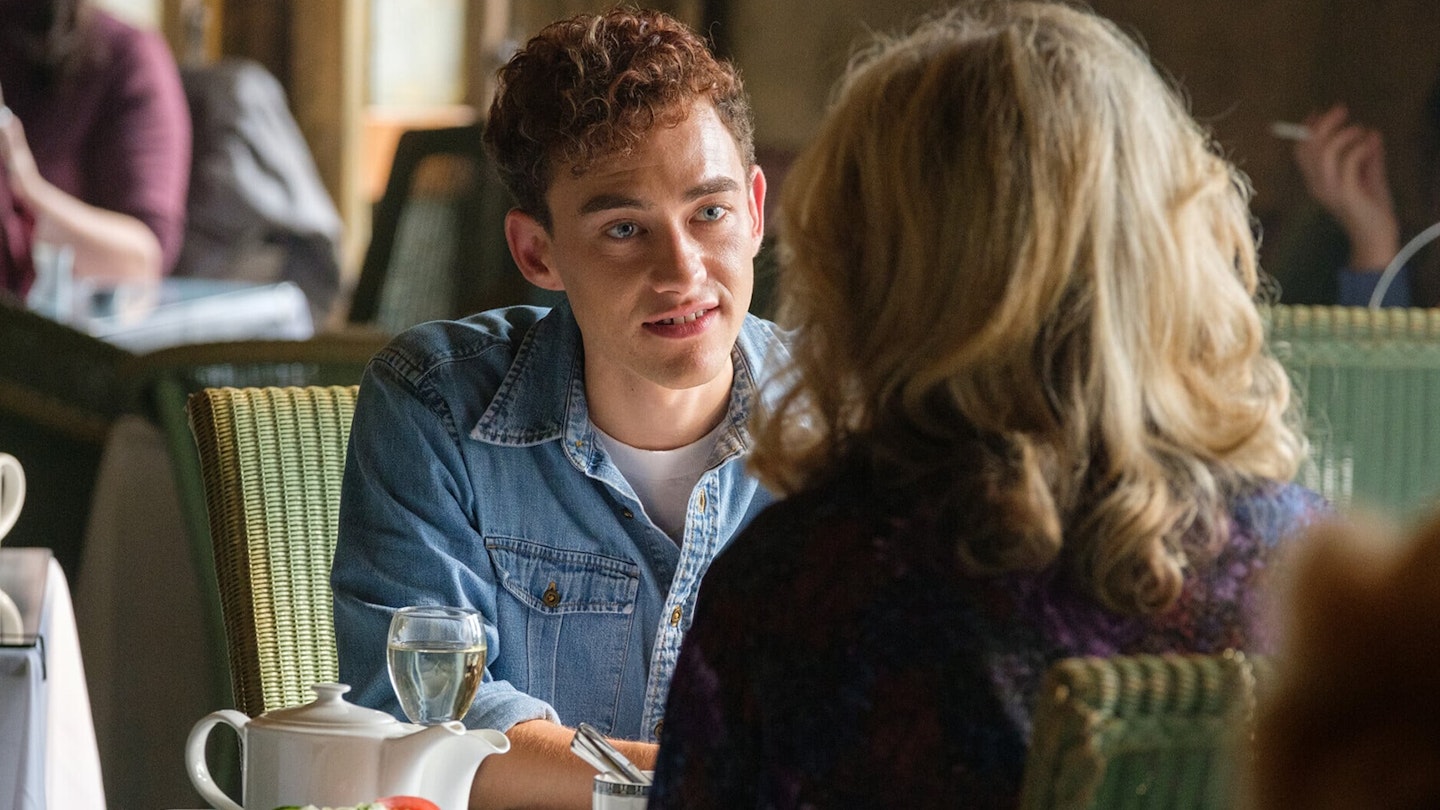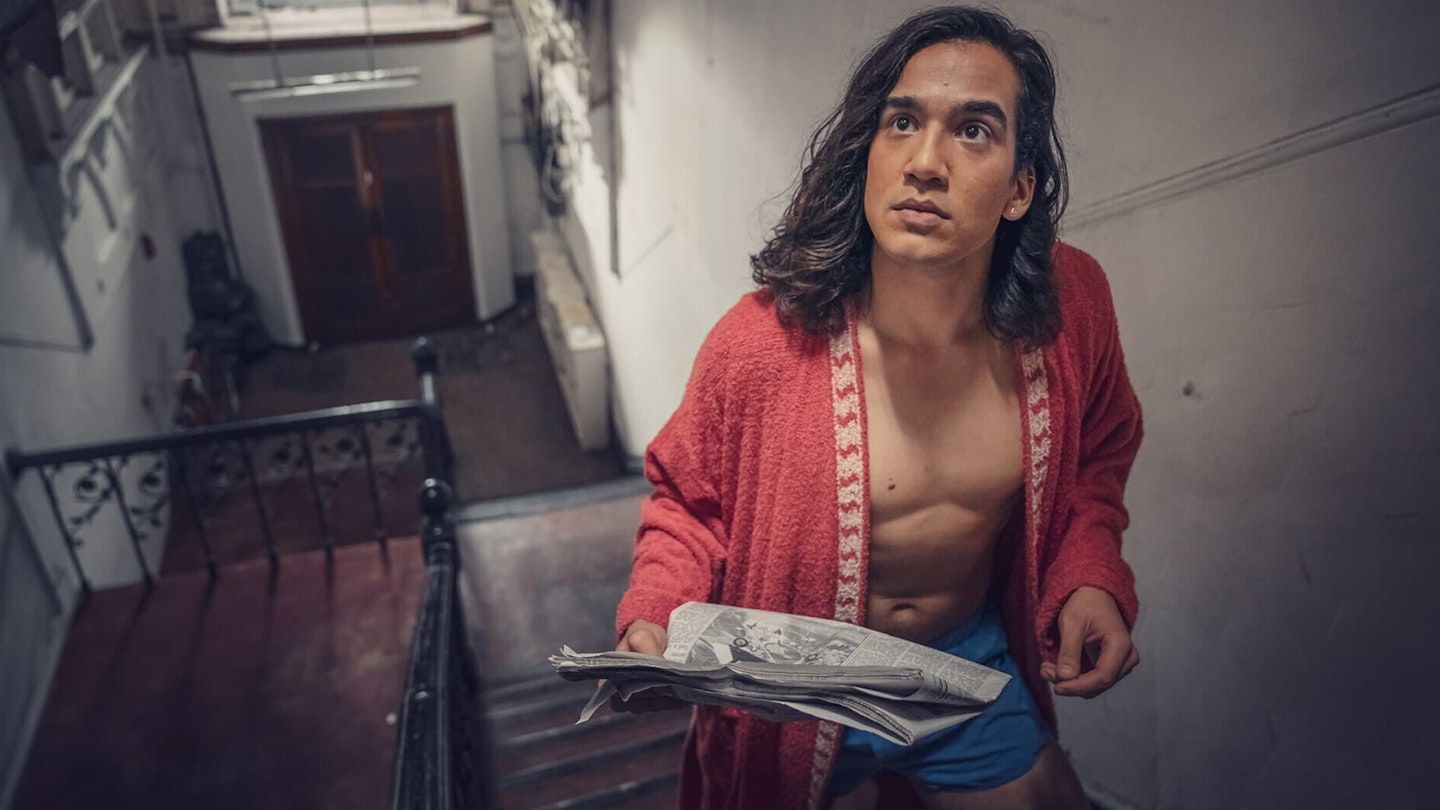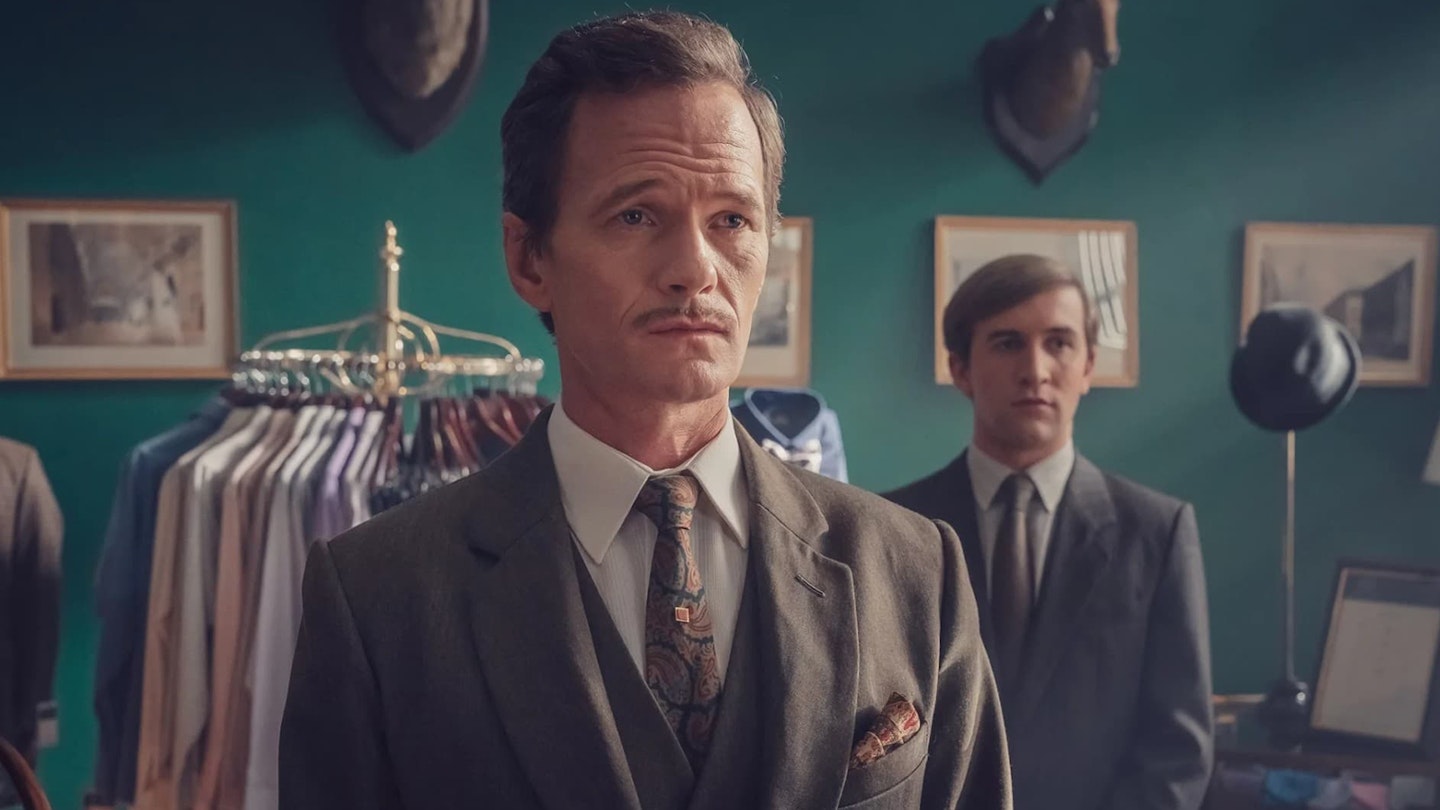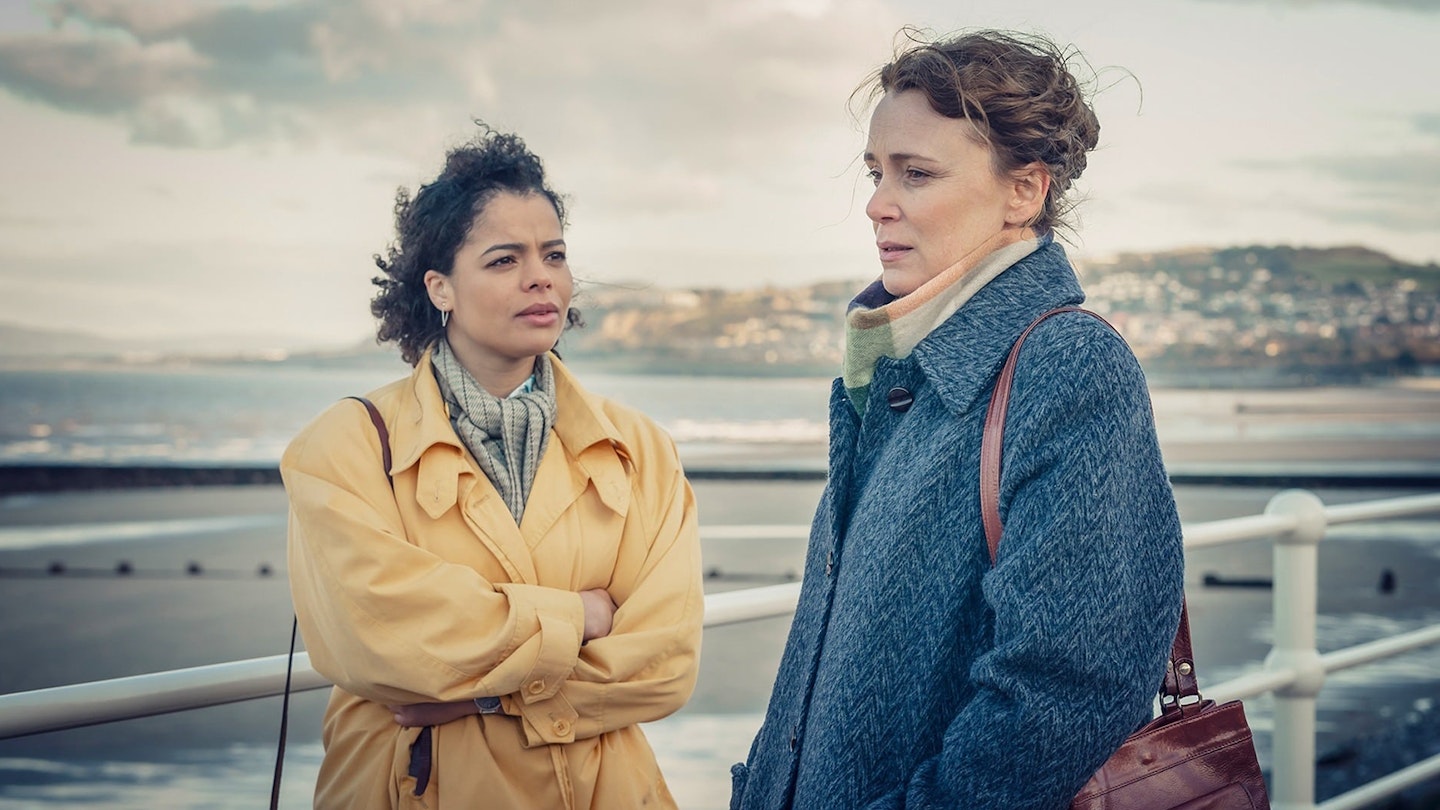This piece first appeared in the February 2021 issue of Empire.
Russell T Davies is exhausted. The story he's had on his mind for decades is finally arriving on television, in the form of visceral, angry, funny, transgressive five-part drama It’s A Sin, and he's still coming to terms with it. When Empire meets Davies, 57, in a London hotel bar, he's still processing it. "I think I'm stunned that, having wanted to write this for about 30 years, we've actually made it." he explains. "And now I'm a little bit bereft."
Once he gets going though, digging deep into the show's long difficult glorious birth, he doesn't seem bereft at all. He's burning with excitement and pride, in fact, palpably thrilled that he's managed to tell the stories of his friends from the 1980s and the virus that cut a swathe through their lives. The series isn't so much broadly autobiographical as specifically based on what happened to the boys Davies knew back then. How AIDS happened to them.

In It's A Sin, directed by Peter Hoar, we meet 18-year-old Ritchie (Olly Alexander, from the band Years & Years), a would-be actor who arrives in London in 1981, and with fellow gay lads Roscoe (Omari Douglas) and Colin (Callum Scott Howells), moves into a flat which they call the Pink Palace. The Pink Palace really existed. Davies friends from Swansea really did end up living there, and then AIDS really did change everything.
For Davies, this story is a culmination of his work, from Queer As Folk – the sexy, groundbreaking ‘90s drama which made him famous overnight, mainly because he had young, pre-Sons Of Anarchy Charlie Hunnam getting a good rimming from pre-Game Of Thrones Aidan Gillen – to his interrogation of gay male shame in 2015's Cucumber. Together, these series forma decades-spanning exploration of the gay experience, with a little break in the middle when he took on Doctor Who, and turned it into the number one snow on British television.
Of all those achievements, It’s A Sin may well turn out to be the finest, certainly the most important, and for Davies, the most difficult to get commissioned and even tougher to write.

You've been talking about writing a drama about AlDS for years. Why did it take so long to get it made?
It went round the houses. After we made Cucumber for Channel 4 in 2015, it went to them and although no-one would ever say this to my face, I think they thought they’d done their gay-men story. And that's completely fine. But a lovely commissioner at Channel 4 called Lee Mason put it in his drawer and it sat there for two-and-a-half years until everyone changed jobs and new people came in and he opened that drawer and said, "I've got a drama!" And along came [new Channel 4 boss] Ian Katz, who read it and said, "Oh yes, let's do that…", and it was commissioned in a day. Strange, isn't it?
Do you know why it was turned down originally?
They don't tell you. I have to guess. But it is a tough sell. People die. It's a really sad story and also, you do kind of think it’s already been told, but you really have to stare that down. Also, there's no murder in this, no investigation. We're in a world of TV high concepts, and this is about the passage of time, about a decade in these people's lives. I was told. "This script will be better if you start in the hospital where people are dying and then say, 'Five years earlier", but I refused to do that. I think it would have been commissioned immediately if I'd agreed to that framing device. But I couldn’t do it. It’s like asking me to do something cheap and rubbish and sensational. I needed to start it in 1981, when AlDS is just a little rumour on the horizon, a strange little mystery, like a fable. That's what it was like. I was there. And I think that’s what held it up... But I wrote Years And Years instead, so it was fine.
Did you have to go back and research what went on back in the '80s or is it all still in your head?
It was all there. A lot of this is based on the stories of people I knew. All the pivotal moments are absolutely true. The scenes that look most made up did actually happen. I did do an awful of lot of reading to remind myself of what it was like. But in fact, a lot of what's been written is told in hindsight – about AIDS activism, for example. Let me tell you, if you were a young lad like me in the early '80s, AIDS didn't exist yet. It did exist for a small group of very forward-looking people in London and New York, but on my level, if you were sitting in a pub aged 21, it didn't exist. Which is why I wrote a big scene in Episode 2 where Ritchie denies the existence of HIV, because I've never seen that dramatised. It sounded like an impossible thing. A "gay plague"? How could that happen? Ritchie talks about how he's heard AIDS only affects haemophiliacs, homosexuals and Haitians, and he's thinking, "It can't just affect people beginning with the letter H!" And that was me at the time, thinking, "This is just a rumour, it cannot be real." But it was all true.

How difficult was it to write this story?
It was one of the most difficult things I've had to write. There are repeated deaths and I had to dramatise each one in a different way. I've had to use every trick in the book, every skill, every discipline and any talent I have to make it different, to tell these stories, and to not add tricks to it. I also pitched it as eight episodes and in the end, I've had to condense everything down to these five episodes. Channel 4 is only making four-parters now. But with all those deaths, I needed to give the story room to breathe, and they did give me another episode. But I had to beg for it!
Why did you change the title from the original 'Boys'?
The funny thing was, we always knew we'd have to change it when The Boys came along [on Amazon Prime], but Channel 4 liked the title 'Boys' and it wouldn't shift. For two years we had meetings and we'd sit there going, "Shall we call it 'Burn Bright'? Shall we call it 'Lost Boys'? "The Generation Lost’?” But none of them sounded right, and for two years I could not think of a title. And then one day there came an email from [co-producers] HBO Max, saying, "We need a new title by Friday," and I literally turned around and went, “Oh, It’s A Sin!’ It was as if that title had been there all along wedged in my subconscious. And now I love the title. It was weird how it just clicked like that.
"It's a celebration. In a show in which sex is going to kill people I needed to find those moments of saying and showing that sex is joyous."
And it's a classic Pet Shop Boys song. Those '80s songs play a key part in the series. Do you specify which ones you want in the script?
Oh, yes – and it helps to have them in the script so we can budget for them in advance, although we did run out of money. Eighties music is expensive, and publishing rights are out of control. There are loads of songs we had to drop. Try getting a Queen song in there, for example. If you see a show with a Queen song on the soundtrack, you know it's made by millionaires. But we do still have a lot of brilliant ‘80s songs in there. We’ve got Kate Bush, and she had to give special permission. She sent a message saying she was delighted to be a part of one of my shows, which was incredible.
You also use Hooked On Classics as the soundtrack to an epic sex montage...
Yes, well, I was determined not just to use cool songs. We weren’t cool. No-one is cool. We used to sit there in the pub listening to Jive Bunny. And love how we’ve got the big sex montage to ‘Hooked On Classics’. I must have listened to that music ten million times, to get the timing right of all those scenes of fucking to it.
It feels quite celebratory when it comes to the sex scenes – was that a conscious thing?
Oh, yes. It's a story about spunk and sweat and blood. It's about a virus that is transmitted via fluids, so I was thinking right from the beginning you have to get visceral with it. In that first episode Ritchie has to wash his arse, and that’s one of the things you have to learn when you’re a daft 18-year-old kid. I have to say, I felt fairly radical writing that back in 2016, but now we've lived through brilliant Michaela Coel’s I May Destroy You – with the tampons and the condoms and the blood clots – and I feel almost old-fashioned. I love going into that territory that drama doesn’t usually talk about, because that’s life. Twenty years ago in Queer As Folk I was doing rimming – deliberately, because I thought that was a really fascinating sexual experience that was never portrayed. So it was all the more important to address that stuff in this series, because it is about a virus on a biological, physical, bodily level.

You had an intimacy co-ordinator on set, but how does that affect the writing of those scenes?
Well, I still write them very specifically. So that montage to ‘Hooked On Classics’ is about Ritchie very specifically moving through various levels of sex. It’s not just a random blur of sex. It starts with him wanking, which goes to blow jobs, which goes to fucking actively, which goes to fucking passively, which goes to threesomes, which goes to… joy. There were some execs who thought there was too much sex, and I was saying, "This isn't just sex: it's Ritchie learning how to do it.” Like we all do. So yes, it is a celebration. In a show in which sex is going to kill people I needed to find those moments of saying and showing that sex is joyous. It was very important to do that.
It feels like this series shares a lot of DNA with Queer As Folk, more than anything else you’ve done since then.
Yes, well, at one point there was a move to call it 'Queer As Folk: 1980'. But we thought that title might have swallowed the drama a bit. But yes, you can imagine the boys in this show bumping into young Stuart and young Vince from Queer As Folk.

Has your writing changed from then to now?
I think it’s all very much of a piece. I think it is a body of work. I’m very delighted to have covered the ‘90s in Queer As Folk, and Cucumber was the 2000s and 2010s, and I’ve gone back to the ‘80s for this, and the Jeremy Thorpe story we told in A Very English Scandal covered the ‘60s and ‘70s. I feel like I’ve covered those eras and found a different story in each one.
And Years And Years dealt with the near future...
Oh yes, I did the next 20 years as well. And Doctor Who goes up to the year three trillion!
When you were in charge of Doctor Who, was there anything you wanted to do but couldn't?
That's interesting... I think I did the Doctor Who side of things ten years too early. I think I did that genre too early. Imagine doing it now with a streaming budget, like a Stranger Things or a Good Omens type of budget. Doctor Who was very cheap. Still is, really. What we did with it is still a miracle, and I had a glorious time working on that show. I worked myself to death, mind you. It was a mad time. It was successful beyond my wildest dreams, but I try not to look back on that time because success teaches us nothing.

Would you want a huge budget for this type of show, though?
I’d love it! I mean, there’s a version of It’s A Sin that is ten episodes long across many seasons. It would immerse you in 1981 with ten episodes, then you’d do ten episodes on 1982, etc. There’s a big streaming version of this that I would have loved to have written. I look at those Ryan Murphy shows with proper envy, those shows where you can do whatever you want.
Do you feel we really are in a golden age of TV, particularly for writers and showrunners?
Yes, and it’s glorious, like when you see someone like Michaela Coel flourishing in that role. We’ve never seen anything like I May Destroy You before. She re-wrote all the rules. Brilliant. To get that at the same time as Phoebe Waller-Bridge – we are living in a golden age. And it makes me sit there and think, “I have to up my game now.’ You can’t just write, “Man dies of AIDS.’ You’ve got to use your arsenal, and get all your weapons out and make it different and entertaining and astonishing – that’s what the writers are doing at the moment.
Did that kind of challenge spur you on when you were writing It’s A Sin****?
I think so. I reached the point where I was ready to write it and had to write it. People ask, “Why tell this story now?” Well, I do feel that the memory of all this is fading and I feel the need to show what happened, how a lot of the families of the men who died could not accept that their sons died of AIDS. I could show you families who are still burning with anger from what happened to their sons. And they’re still in denial about it. It’s terribly sad. And it happened to friends of mine. That’s why I’ve always wanted to write this. That’s why the final episode has taken 25 to 30 years in my head to boil until it was ready. And fuck it, then I go for it. When it came to writing that episode, I was thinking, “Finally, I’m here.” I had to wrestle that script into submission. For me this is a story that had to be told. It’s important to me. I would have been on my death bed really disappointed with myself if I hadn’t told this story. So thank God for Lee Mason keeping it in his drawer.
